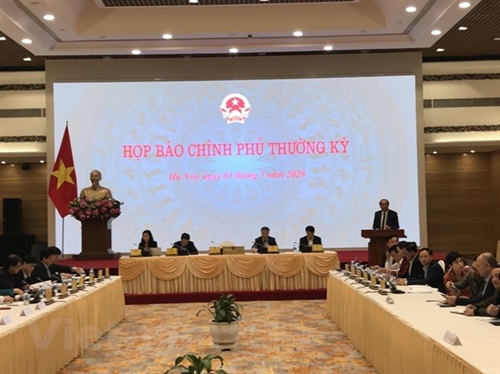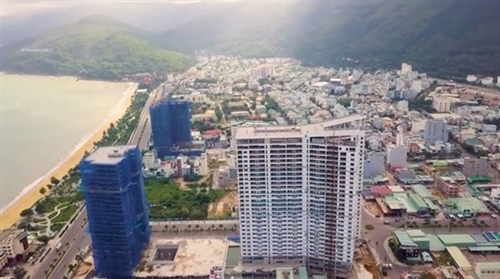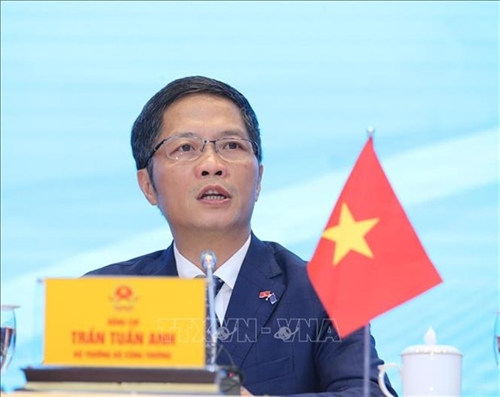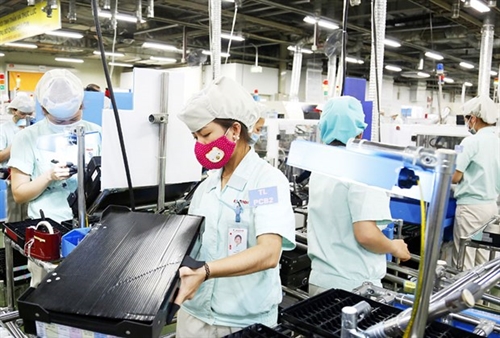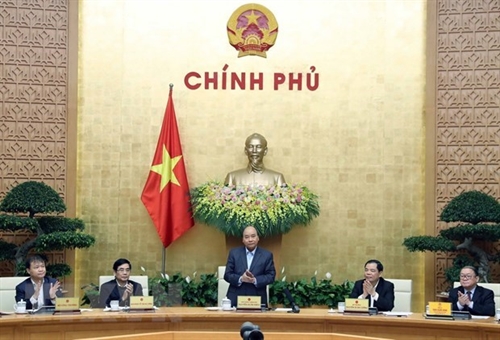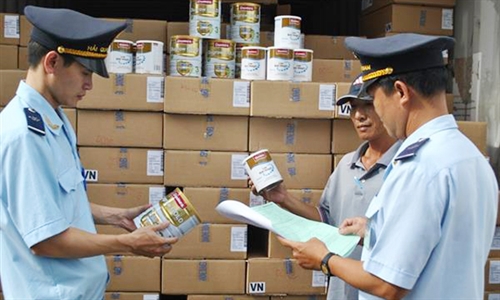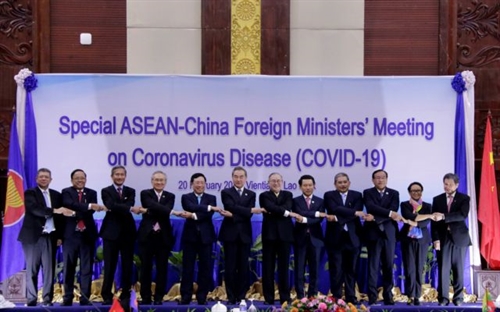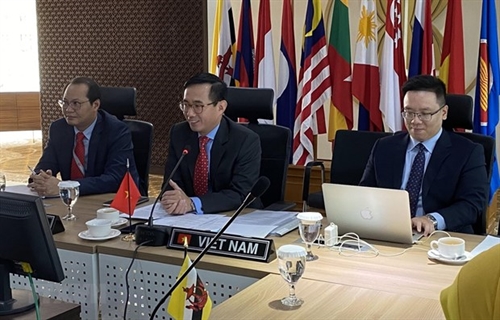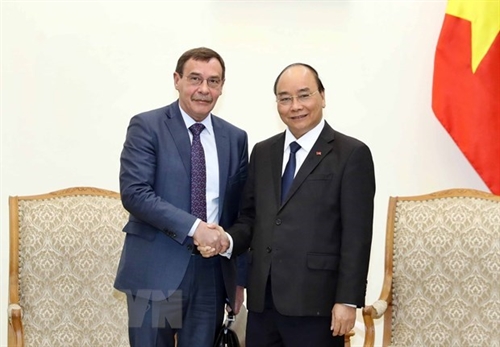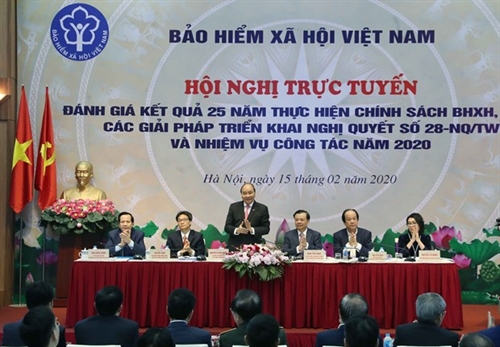There have been no political organizations in Vietnam except the Communist Party of Vietnam (CPV) that has enough will, courage, determination, brainpower, experience, prestige and capacity to lead the country to overcome difficulties and challenges, and drive the national revolutionary cause from one victory to another.
Party General Secretary and President Nguyen Phu Trong made the statement at a ceremony marking the CPV’s 90th founding anniversary in Hanoi on February 3.
The top leader looked back on the process of establishment, training, devotion and development of the CPV and highlighted the historical significance of its foundation on February 3, 1930.
“The Vietnamese revolution’s diverse and vivid reality over the past 90 years has demonstrated that the Party’s sound and clear-sighted leadership is a decisive factor to ensure all revolutionary victories and make many exploits in Vietnam,” he said.
Mentioning the achievements Vietnam has gained during nearly 35 years of doi moi (renewal) cause, Trong said Vietnam has emerged as a developing country with middle income, while its political and social stability has been maintained, national defense-security, independence and sovereignty firmly consolidated, and position and prestige in the international arena heightened.
The country has to date joined most of international organizations and become an active and responsible member of the international community, he stressed, noting that Vietnam has recently been elected for the second time as a non-permanent member of the United Nations Security Council in a landslide vote.
“With the obtained great achievements, we have the foundation to affirm that our country now has the best-ever fortune, potential, position and prestige,” the leader stressed.
He emphasized the need to carry forward fine traditions, maintain and spur the Party’s revolutionary nature and its pioneering role during the Party building and rectification work.
It is a must to build a pure and strong Party in terms of politics, ideology, morality, apparatus and personnel, revamp leadership methods, strengthen the close-knit relations between the Party and people, prevent and push back degradation, and enhance the Party leadership and combat capacity, considering this a vital task of the Party and regime, he said.
Trong also pointed out major tasks in 2020 - the final year of the 12th National Party Congress, such as completing all socio-economic development targets, reinforcing macro-economic stability, accelerating the implementation of strategic breakthroughs, restructuring the national economy in tandem with reforming the growth model, ensuring social security and welfare, and improving people’s living standards.
He also called for greater efforts to firmly maintain national independence and sovereignty, keep a peaceful and stable environment to serve national development and promote external relations.
Due attention should be paid to the successful organization of Party congresses at all levels, toward the 13th National Party Congress, as well as the implementation of resolutions on the Party building adopted at the fourth plenums of the 11th and 12th Party Central Committees, and the Political Bureau’s Directive 05 on promoting the study and following of President Ho Chi Minh’s thought, morality and lifestyle, thus creating stronger changes in the Party building and rectification work, the leader stressed.
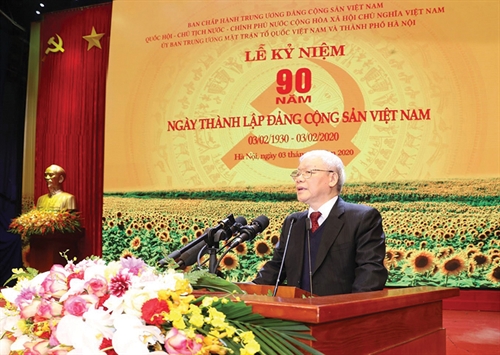 |
| Party General Secretary and President Nguyen Phu Trong delivers a speech at a meeting celebrating the 90th founding anniversary of the Communist Party of Vietnam in Hanoi on February 3__Photo: Tri Dung/VNA |
International friends appreciate Party’s leadership over 90 years
On the occasion of the CPV’s 90th founding anniversary, emeritus professor Carl Thayer from the New South Wales University, Australia, Professor Vladimir Kolotov, General Director of the Ho Chi Minh Institute of Saint Petersburg State University in Russia, and other politicians shared their thoughts on the role of the CPV in the country’s revolution.
According to Professor Thayer, the CPV has demonstrated its leadership on 10 major events to free Vietnam from foreign domination and to establish a reunified and independent Vietnam.
First, the Vietnamese revolutionaries who founded the CPV in February 1930 united other revolutionary organizations from the three regions of Vietnam and became a truly national party.
Second, the CPV joined the Communist International in 1930 and assumed responsibility for struggle against colonialism across French Indochina, including Laos and Cambodia. The CPV demonstrated leadership by linking Vietnam’s struggle with the world struggle against colonialism and imperialism.
Third, the CPV demonstrated its revolutionary credentials by supporting the peasants who rose up in the revolt against the French (the Nghe Tinh Soviet Movement) in 1930-31.
Fourth, the CPV took the lead against fascism and colonialism in 1941 when it founded the League for the Independence of Vietnam and pursued a national-democratic or two-stage revolution.
Fifth, the CPV took the decisive step of seizing the opportune moment and successfully launched the August Revolution that led to the declaration of Vietnam’s independence on September 2, 1945. Vietnam became one of the first colonies to do so, thus contributing to the worldwide struggle against colonialism.
Sixth, the CPV successfully led the war of resistance against French colonialism from 1946-54 by waging a people’s war. This culminated in the Dien Bien Phu Victory in May 1954.
Seventh, the CPV took a bold step in negotiating with France to end their armed conflict at Geneva, Switzerland, in 1954. Although Vietnam was partitioned, the CPV had a firm base in North Vietnam that had a capital city, Hanoi, and a port to the outside world, Hai Phong. The Democratic Republic of Vietnam was linked to China and by rail to the Soviet Union. The CPV leaders (then Vietnam Workers’ Party or VWP) were able to carry out land reform, agricultural collectivization and begin the initial steps toward industrialization.
Eighth, in January 1959 the VWP took the decision to resume armed struggle in South Vietnam in order to reunify the country.
Ninth, the VWP took the lead in mobilizing the Vietnamese people to successfully resist the US Air War in the North by dispersing people from the cities and utilizing advanced weapons from the Soviet Union and China.
Tenth, the VWP successfully prosecuted the war against the US in the South by matching the conventional strategy of the US and devising new means to achieve victory such as the 1968 Tet Offensive and the 1975 Spring Offensive.
Asked about the CPV’s policies significant to Vietnam’s socio-economic development and international relations over the past years, Thayer cited the renewal policy adopted by the CPV in late 1986, under which Vietnam ended Soviet-style central planning and initiated private, largely family-based, production. This led to a marked rise in rice production and an explosion in light industry. At the same time, Vietnam expanded trade relations and promoted foreign investment with other countries to help develop a “socialist-oriented market economy.” Vietnam’s economic growth has led to a marked decline in poverty as Vietnam became a lower middle-income economy.
According to the Australian scholar, the most important turning point in international relations came in 1987-88. In 1987, Political Bureau’s Resolution 02 provided the foreign policy objective of withdrawing military forces from Cambodia. In May 1988, the Political Bureau adopted Resolution 13 entitled “On the Tasks and Foreign Policy in the New Situation”. This resolution set a priority on economic development through a multi-directional foreign policy with the goal of making “more friends, fewer enemies”.
Subsequently, all national party congresses have endorsed and elaborated on this policy with great successes. Vietnam normalized relations with China and the US and joined the Association of Southeast Asian Nations as its sixth member. Vietnam now has 16 strategic and 12 comprehensive partnerships with the major powers. The country is successfully pursuing “active, proactive economic integration” through bilateral and multilateral free trade agreements.
Talking about challenges to the CPV’s leadership in Vietnam in the coming time, Thayer said there are two major concerns, among many, that currently preoccupy CPV leaders. The first is the issue of how to sustain current economic growth that is equitable across society and protects the environment. There are many variables that will influence this objective: the impact of continued economic tensions and tariff wars between the US and China, a slowdown in the global economy, domestic corruption, protectionism in Vietnam’s major markets, the pace of privatization of state-owned enterprises, and Vietnam’s ability to absorb the technologies that are part of the Fourth Industrial Revolution.
The second major concern relates to the possibility of tensions, arms race, and armed conflict in the East Sea, Taiwan Straits, East China Sea, and Korean peninsula. All of these conflicts are likely to involve China.
Finally, Vietnamese leaders will be preoccupied with preparations for the 13th National Party Congress in early 2021 to ensure a smooth political transition and consensus on the main socio-economic policies for the next five years and beyond.
Meanwhile, Professor Vladimir Kolotov said the Vietnamese revolution’s historic events and the CPV’s leadership have heightened the country’s prestige and stature.
With a new political combat method, the Vietnamese communists laid a foundation for a national liberation campaign, gathering people of all walks of life to successfully carry out the 1945 August Revolution and establish the Democratic Republic of Vietnam.
That victory and the nation’s path to national liberation served as an example for countries worldwide, he said.
Vietnam then overcame the US’s embargo following the 1975 victory thanks to the country’s policies and guidelines that helped protect its interests from external pressures, irrespective of defense, economic, diplomatic or political pressures.
The CPV manifested its flexibility with the prompt issuance of the renewal policy. The country conducted economic reform amid difficulties with the ultimate goal of protecting national interests despite changes to conditions and strategies.
Vietnam has never achieved high stature like now, which is a result of the CPV’s fight for national liberation, reunification and development, with high economic growth for many years.
Achievements in the past three decades have made it easier for Vietnam to set orientations for the future, Kolotov said.
The CPV has a decisive role in all victories of the national revolution since it was set up in 1930, affirmed Sounthone Sayachak, a member of the Lao People’s Revolutionary Party (LPRD) Central Committee and head of its Commission for External Relations.
She said that the founding of the CPV is the combination of the Marxism-Leninism, international communist and workers’ movement, and patriotic movement in Vietnam.
Since its appearance in the political arena, the CPV has proved itself as a genuine revolutionary party capable of gathering all national strengths in the fight against colonialism, imperialism and feudalism, she noted.
Sayachak expressed her belief that the CPV will continue leading the Vietnamese people in the cause of building Vietnam into a socialist nation, promoting industrialization and modernization, and successfully realizing the goal of a prosperous people, strong nation, and democratic, equitable and civilized society.
Sharing similar views, Jean-Pierre Archambault, General Secretary of the France-Vietnam Friendship Association (FVFA), said the CPV is a political force which led the revolutionary struggle of the Vietnamese people to regain freedom and independence for the nation.
Vietnam, under the CPV’s leadership, has gained remarkable economic growth and international integration achievements, he said.
Archambault expressed his admiration at great progresses of Vietnam thanks to its renewal policy that has been implemented since 1986.
Vietnam escaped from the group of the most difficult countries, reaching the status of middle-income country in 2010, he said, adding that the nation achieved an annual average growth of 6-7 percent over the past 10 years, becoming one of the fastest growing economies in Southeast Asia.
The politician attributed Vietnam’s successes in international integration to the strong political spirit of the Vietnamese Party, State and people.
Vietnam has so far established strategic cooperation with about 30 countries worldwide, including all the five permanent members of the United Nations Security Council (UNSC). Especially, the country has been elected as a non-permanent member of the Council for the 2020-21 tenure. This proves Vietnam’s increasing position in the international arena, improved by the country’s achievements over its renewal process, and the trust of the international community in Vietnam’s foreign policy, he said.
Vietnam’s presence in the UNSC benefits the country itself, as actions and contributions of the Council will certainly help promote peace, stability and cooperation, and ensure sustainable growth and development, Archambault said.-
